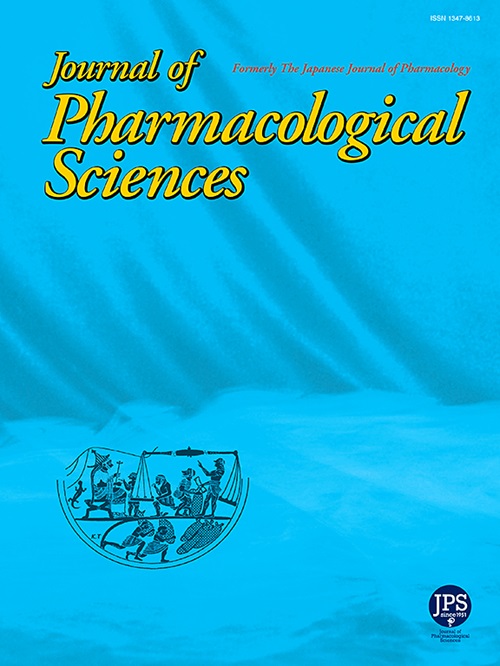TND1128, a 5-deazaflavin derivative with auto-redox ability, facilitates polarization of mitochondrial membrane potential (ΔΨm) and on-demand ATP synthesis in mice brain slices
IF 3
3区 医学
Q2 PHARMACOLOGY & PHARMACY
引用次数: 0
Abstract
TND1128, a 5-deazaflavin derivative, is a drug with self-redox ability. We examined the effect of TND1128 on the level of mitochondrial membrane potential (ΔΨm), which is the most critical motive power for the biosynthesis of ATP. We prepared brain slices from mice pretreated with TND1128 (0.1–10 mg/kg, intraperitoneally) and detected ΔΨm level with JC-1, a fluorescence ΔΨm indicator. We further examined the depolarization of ΔΨm under 5-min exposure to 25 mM KCl-ACSF (25K-ACSF), which activated neuronal voltage-dependent Ca2+ channels. We evaluated the effect of TND1128 by using the inverse number of the ΔΨm value as the ATP synthesis index (ASI). The level of ΔΨm increased significantly by 24-h pretreatment with TND1128 (10 mg/kg), and significantly higher depolarization of the ΔΨm was observed with 25K-ACSF exposure than in non-treated control. We found a significant decrease in 25K-ACSF induced [Ca2+]c and [Ca2+]m levels in the TND1128-pretreated preparations. We confirmed the dose and time-dependent facilitatory effects of TND1128 on the ASI. This study suggested that TND1128 could be incorporated into the TCA cycle and electron transfer chains to facilitate the polarization of ΔΨm and activate on-demand ATP synthesis. TND1128 might rescue neurons in various brain diseases caused by energy defects. (198)
TND1128是一种具有自动氧化还原能力的5-去氮黄素衍生物,可促进小鼠脑切片线粒体膜电位(ΔΨm)的极化和按需合成 ATP
TND1128是一种5-去氮黄素衍生物,是一种具有自我氧化还原能力的药物。我们研究了 TND1128 对线粒体膜电位(ΔΨm)水平的影响,线粒体膜电位是生物合成 ATP 的最关键动力。我们制备了用 TND1128(0.1-10 mg/kg,腹腔注射)预处理的小鼠脑片,并用荧光ΔΨm 指示剂 JC-1 检测ΔΨm 水平。我们进一步检测了ΔΨm在暴露于25 mM KCl-ACSF(25K-ACSF)5分钟后的去极化情况,KCl-ACSF可激活神经元电压依赖性Ca2+通道。我们用ΔΨm值的倒数作为ATP合成指数(ASI)来评估TND1128的效果。用TND1128(10 mg/kg)预处理24小时后,ΔΨm的水平明显升高,并且观察到暴露于25K-ACSF的ΔΨm的去极化程度明显高于未处理的对照组。我们发现,在 TND1128 预处理的制备物中,25K-ACSF 诱导的[Ca2+]c 和[Ca2+]m 水平明显下降。我们证实了 TND1128 对 ASI 的促进作用具有剂量和时间依赖性。这项研究表明,TND1128可被纳入TCA循环和电子传递链,以促进ΔΨm的极化并激活按需ATP合成。TND1128 可能会挽救因能量缺陷导致的各种脑部疾病中的神经元。(198)
本文章由计算机程序翻译,如有差异,请以英文原文为准。
求助全文
约1分钟内获得全文
求助全文
来源期刊
CiteScore
6.20
自引率
2.90%
发文量
104
审稿时长
31 days
期刊介绍:
Journal of Pharmacological Sciences (JPS) is an international open access journal intended for the advancement of pharmacological sciences in the world. The Journal welcomes submissions in all fields of experimental and clinical pharmacology, including neuroscience, and biochemical, cellular, and molecular pharmacology for publication as Reviews, Full Papers or Short Communications. Short Communications are short research article intended to provide novel and exciting pharmacological findings. Manuscripts concerning descriptive case reports, pharmacokinetic and pharmacodynamic studies without pharmacological mechanism and dose-response determinations are not acceptable and will be rejected without peer review. The ethnopharmacological studies are also out of the scope of this journal. Furthermore, JPS does not publish work on the actions of biological extracts unknown chemical composition.

 求助内容:
求助内容: 应助结果提醒方式:
应助结果提醒方式:


